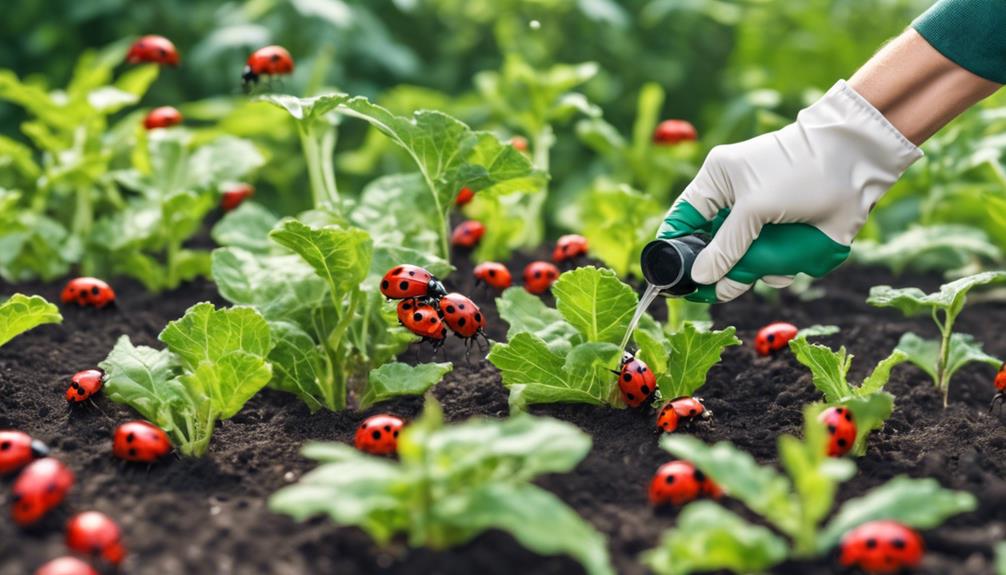Did you know that according to a recent study by the Environmental Protection Agency, over 90% of homes in the United States have detectable levels of pesticides?
When it comes to safeguarding your vegetable garden from pests while maintaining its health, utilizing DIY pest control solutions can be both effective and environmentally friendly.
From homemade oil-based insecticides to natural plant-derived remedies, there are numerous options available to help you tackle garden pests without harsh chemicals.
Discover how these DIY solutions can not only protect your vegetables but also promote a thriving garden ecosystem.
Non-Chemical Pest Control Methods
To effectively manage pests in your vegetable garden without using chemicals, consider implementing proven non-chemical pest control methods. One effective approach is making a Homemade spray using natural ingredients like soap and oil. This mixture can be applied to the leaves of your plants to deter insects.
The soap disrupts the insects’ cell membranes, while the oil suffocates them, providing a natural defense for your garden. By utilizing Homemade sprays made from ingredients like vegetable oil, you can control pests without harming beneficial insects or introducing chemicals into your garden ecosystem.
These non-chemical pest control methods not only protect your plants but also contribute to the overall health and sustainability of your vegetable garden.
Vegetable Oil and Soap Sprays
An effective and sustainable approach to pest control involves using ingredients you likely already have in your home. Vegetable oil and soap sprays are at the forefront of this method. Here’s how and why they work:
- Action Mechanism: The soap in the mixture breaks down the insects’ protective cell membranes, while the oil coats and suffocates them. This dual-action approach provides a potent defense against pests.
- Benefits: This method is natural, safe, and eco-friendly, ensuring that your garden remains free from harmful chemicals. It’s effective against a wide range of common garden pests, including aphids, mites, and thrips, without damaging your plants or the beneficial insects that inhabit your garden.
- Preparation and Use: Combine a small amount of mild liquid soap with vegetable oil and water. Spray this mixture directly onto the affected areas of your plants. Always perform a patch test on a few leaves first to ensure the spray does not harm the plant.
This table summarizes the benefits:
| Benefits | Description |
|---|---|
| Natural and Safe | Harmless to plants and beneficial insects |
| Eco-Friendly | No adverse impact on the environment |
| Effective Against Pests | Works on aphids, mites, thrips, etc. |
| Easy to Prepare | Ingredients are commonly found at home |
| Affordable | Cheaper than commercial pesticides |
| Healthy Garden | Supports the ecosystem of your garden |
Try this method to keep your vegetable garden free from pests without harmful chemicals.
Neem Oil and Diatomaceous Earth Applications
For effective pest control in your vegetable garden, incorporate neem oil and diatomaceous earth applications to combat various pests and maintain a healthy growing environment. Neem oil, a natural insecticide derived from neem tree seeds, disrupts insect life cycles and offers an organic pest control solution.
Diatomaceous earth, made from fossilized algae, acts as a non-toxic physical insecticide by dehydrating pests like snails, slugs, and crawling insects. Both neem oil and diatomaceous earth are safe for plants and the environment, providing a healthy ecosystem for your vegetable garden.
When applied correctly, these natural solutions offer effective pest management, ensuring your plants thrive without the use of harmful chemicals.
- Neem oil: Extracted from the seeds of the neem tree, neem oil is a natural insecticide that interferes with the life cycle of pests. It’s effective against various insects by inhibiting feeding and growth, making it a versatile addition to your pest control toolkit.
- Diatomaceous Earth: Composed of fossilized algae, diatomaceous earth acts as a mechanical pesticide, causing dehydration and death in insects. It’s particularly effective against snails, slugs, and other crawling pests.
- Application Tips: Apply neem oil as a diluted spray, focusing on the undersides of leaves where pests often hide. Spread diatomaceous earth around the base of plants to create a protective barrier.
Garlic and Chile Pepper Sprays
Spice up your pest control strategy with the natural repellent properties of garlic and chile pepper sprays. These potent ingredients serve as effective, eco-friendly options to keep pests at bay:
- Garlic Spray: Garlic’s strong scent is a powerful deterrent for many pests. It can repel or kill aphids, beetles, caterpillars, and more.
- Chile Pepper Spray: The capsaicin in hot peppers makes this spray an excellent choice for repelling various garden invaders. It’s particularly useful against pests that eat or damage foliage.
- Preparation and Safety: Blend garlic or chile peppers with water and a small amount of soap to help the mixture adhere to plant leaves. Use gloves when handling and applying these sprays to avoid irritation.
| Advantages | Description |
|---|---|
| Natural Insecticide | Effectively repels or eliminates pests |
| Homemade | Eco-friendly and easy to make |
| Highly Effective | Proven to control a wide range of pests |
| Caution for Humans | Use protective gloves during preparation and application |
All-in-One Homemade Pest Control Spray
To expand your vegetable garden’s defense against pests, try incorporating an All-in-One Homemade Pest Control Spray. This spray combines garlic, onion, cayenne pepper, and soap for effective pest management. The homemade spray is eco-friendly, safe for plants, and acts as a natural insecticide against a wide range of pests. It offers a cost-effective and customizable solution for maintaining a healthy vegetable garden while avoiding chemical pesticides.
This concoction is a powerhouse against pests:
- Benefits: It’s eco-friendly, safe for plants, and acts as a comprehensive insecticide against a variety of garden pests.
- Customizable: You can adjust the ingredients based on what’s available or according to the specific pests you’re dealing with.
- Cost-Effective: Avoid the expense of commercial pesticides while achieving effective pest control
Frequently Asked Questions
How Do You Make Homemade Pesticide for Vegetables?
To make homemade pesticide for vegetables, you mix natural ingredients like neem oil, garlic, and hot pepper spray. These DIY solutions effectively combat common garden pests like aphids and caterpillars, ensuring your vegetable plants stay healthy and pest-free.
What Can You Put in Your Vegetable Garden to Keep Bugs Away?
To keep bugs away from your vegetable garden, plant bug-repelling marigolds, chives, and basil. Use row covers or mesh netting for protection. Introduce beneficial insects like ladybugs. Try diatomaceous earth or eggshells for crawling pests. Grow mint and rosemary to deter insects.
What Is a Natural Pesticide for Vegetable Plants?
When protecting your veggie haven, go the natural route with neem oil. It’s a potent pesticide derived from the neem tree, knocking out pests like aphids and beetles on your precious plants effectively.
How Do I Get Rid of Bugs in My Garden Naturally?
To get rid of bugs in your garden naturally, mix up homemade insecticidal soap with soap, oil, and water; use neem oil on plants to target pests at all life stages; try vinegar spray to repel a variety of pests; and make garlic spray to deter aphids and other insects.
Conclusion
So there you have it – DIY pest control solutions for your healthy vegetable garden!
With natural remedies like oil sprays, neem oil, and garlic spray, you can keep pests at bay without harmful chemicals.
But before you go, ask yourself: why resort to harsh chemicals when you can protect your garden with eco-friendly alternatives?
Happy gardening!




